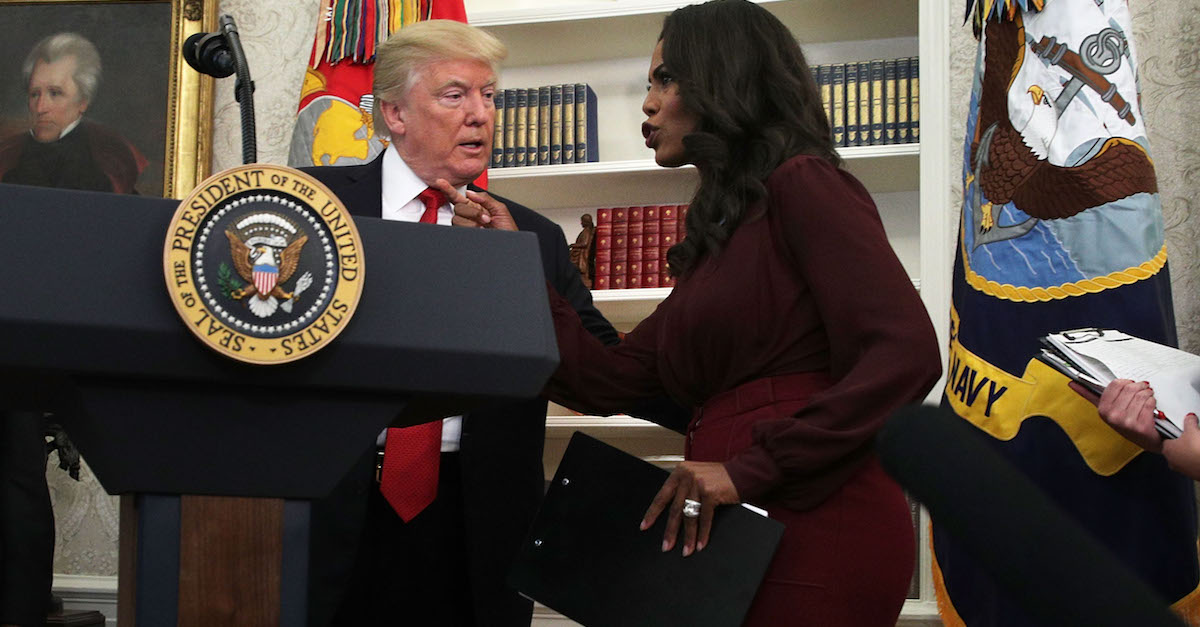
As the predictably juvenile Twitterspat between Omarosa Manigault-Newman and Donald Trump heats up, it’s only natural that calls for defamation lawsuits intensify. My Law & Crime colleague Ronn Blitzer detailed some of Omarosa’s exposure for what appears to be questionable-at-best sourcing. On the flip side, Twitter seems to have already delivered its verdict in Manigault-Newman v. Trump for his e-barbs thrown in Omarosa’s direction today.
Can Omarosa sue #Trump for defamation for calling her a “low-life” in front of millions and millions of people?#Trump #DefendantTrump#OMAROSA pic.twitter.com/rI6iJ2G3Uv
— Sonny Burnett (@SonnyUndercover) August 13, 2018
Looking more and more like Trump is handing Omarosa grounds for a defamation claim. Now that would lead to some awesome pre-trial discovery!
— Space Force Ranger/Democratic Liberation Army (@rappahannockmag) August 13, 2018
In the world of actual law, though, Twitter has got it wrong. Here’s why:
#1 It’s far from clear that Trump’s tweets contain any “false statements of fact” about Omarosa.
I mean “Wacky Omarosa”? That might be the lamest insult moniker we’ve heard yet – but lack of creativity isn’t actionable. Calling Omarosa “not smart,” “Wacky,” or a “lowlife” is silly and immature – but not defamatory; those comments are clearly opinion statements, and accordingly, could not form the basis for defamation.
I suppose Trump’s comments about Omarosa’s job performance – that she “begged [him] for a job, tears in her eyes,” or that she “would constantly miss meetings,” could form a potential basis for defamation – but only if they’re untrue. But how on earth could the truth or falsity of those statements be proven? It’s highly unlikely that there’d ever be enough proof to support a defamation claim.
#2 Omarosa isn’t remotely suffering.
Defamation requires pleading and proof of financial damages. The damages element works as a filter, isolating just those lies that cause a victim real, quantifiable harm. Normally, untrue statements about a person’s poor job performance are fantastic bases for defamation claims –but that’s because normally, it’s harder to get a job when your former boss publicly said you’d been a lousy employee.
Here, however, that logic won’t work. For starters, Omarosa’s street value is probably higher now that she’s positioned herself as a Trump enemy. Furthermore, she’s already making a ton of money on her tell-all book. I’m sure reality show offers will be next (I mean could anything be more full-circle?). Trump’s statements about Omarosa have only helped her – and will likely continue to help her – whether they’re true or not.
#3 Omarosa is definitely a “public figure.”
Don’t be fooled. Omarosa may be a national joke, but she’s still public. Reality-villain-turned-White-House-villain is about as “public figure” as it gets. The fact that we’ve been on a first-name-only-basis with this woman for over a decade is testament to her lasting celebrity. Therefore, Omarosa would have the additional burden of proving that Trump’s statements made against her were made with “actual malice” – meaning that Trump knew or had reckless disregard for the veracity. Proving actual malice is never easy, and given the nature of Trump’s tweets, it would be nearly impossible in this case.
#4 Trump is probably immune from this entire lawsuit.
In 1982, the Supreme Court held in Nixon v. Fitzgerald, that presidents are absolutely immune from civil lawsuits stemming from their official acts as president. In President Trump’s tweets, he’s commenting about a now-former White House employee. That’s definitely related to his official presidential duties – even if he seems remarkably un-presidential in his style. Trump has often said that he uses social media to communicate directly with the American public; certainly if we were analyzing liability based on a weekly radio address or press conference, the Nixon v. Fitzgerald rule would cover the president with an impenetrable blanket of immunity. Sure, Trump’s tweets are infantile, self-serving, and grammatically disastrous – but they are almost certainly “official.”
Twitter may have gotten it wrong on Omarosa’s defamation case against Trump – but seems to be gearing up for an even more interesting legal battle.
Wacky Omarosa already has a fully signed Non-Disclosure Agreement!
— Donald J. Trump (@realDonaldTrump) August 13, 2018
What such an NDA might have to do with Omarosa and her book isn’t entirely clear at this point. But one thing that’s totally clear is that the president cannot force staffers to sign NDAs — something we analyzed the last time Trump tried to gag his staffers with unenforceable contracts.
It’s entirely inappropriate & likely unconstitutional to require Fed employees to sign NDA that applies post-employment beyond classified info. We’ll rep anyone who has signed & wishes to challenge such agreement pro bono. @BradMossEsq https://t.co/Hjia3THh69
— Mark S. Zaid (@MarkSZaidEsq) August 13, 2018
Enforceability aside, though, this prediction really would be entertaining:
Next plot twist clear:
1. Trump sues Omarosa to enforce NDA
2. Omarosa retains Avenatti to defend her— Allahpundit (@allahpundit) August 13, 2018
(Photo by Alex Wong/Getty Images)
This is an opinion piece. The views expressed in this article are those of just the author.